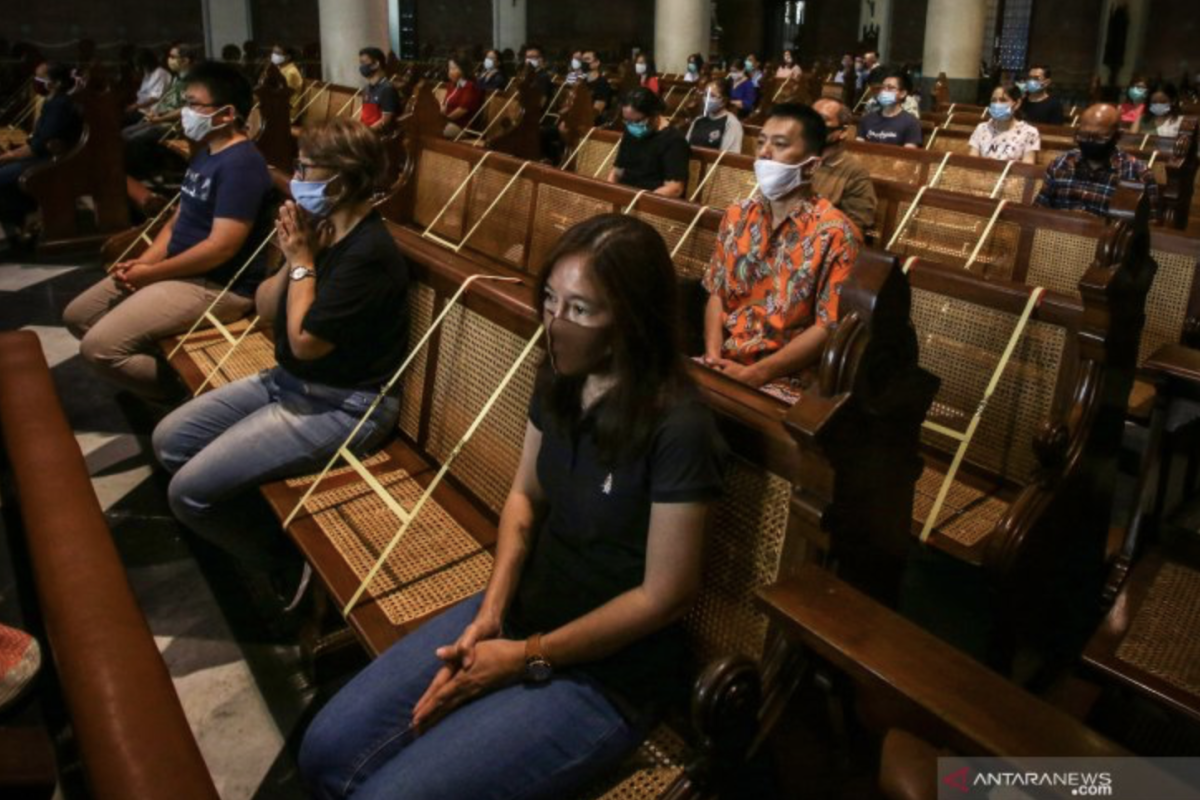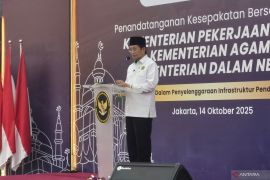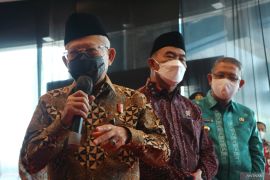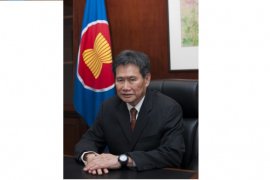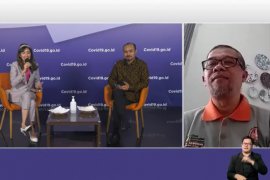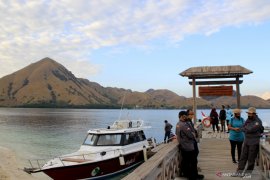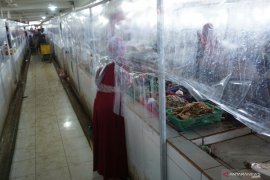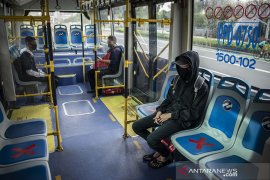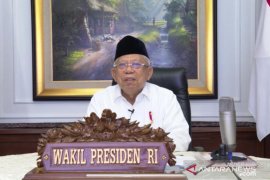The atmosphere was definitely different, but for me, it was more serene and gave me some time to reflect and pray for the pandemic to soon be overJakarta (ANTARA) - On July 4 this year, as the Hindu congregation in Jakarta celebrated Saraswati Day, Dewa Wiguna visited the Aditya Jaya Temple in East Jakarta to join mass prayers.
The holy day was observed in the first few days of the new normal's implementation in Jakarta, as the government worked to restore activities while still making efforts to stem the spread of COVID-19.
"Upon entering the temple, there were customary security personnel (pecalang) standing by to conduct temperature checks. Since I passed the check, I went in to the temple and was asked to wash my hands with running water and soap," Wiguna told ANTARA.
The Bali native, who is currently residing in the capital city for work, said he did not get to visit the temple for a few weeks when it was closed during the implementation of large-scale social restrictions (PSBB) in Jakarta.
During the period, people of all faiths were asked to carry out religious practices at home to curb the spike in COVID-19 cases in the city, and across the nation. During the restriction period that lasted no less than 8-10 weeks, Wiguna stopped attending the weekly prayer rituals at the temple.
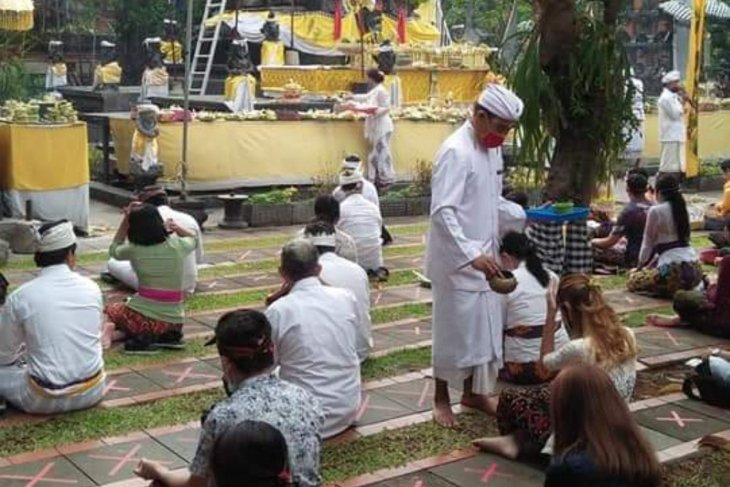
The temple masters, he continued, also wore masks and protective face shields as they splashed holy water on the congregation
"The atmosphere was definitely different, but for me, it was more serene and gave me some time to reflect and pray for the pandemic to soon be over," he said.
As Indonesians gradually proceeds towards the so-called new normal, almost every aspect of their activities is experiencing some degree of change: from the way they work, commute, shop for groceries, to even how they worship and hold wedding ceremonies.
The Indonesian government has recently decided to implement the new normal period. Despite hesitations, the government has decided to restore economic activities in the country, which have been hit hard by the pandemic.
The reopening of public facilities and transportation in the new normal era has come with pre-requisite conditions that need to be met as Indonesia is still striving to stem the spread of the disease that has claimed over 4,000 lives, with almost 85,000 infections reported so far.
In the capital city of Jakarta, places of worship were among the public facilities that braced for reopening and ensured their preparedness before receiving people on a daily basis. Governor Anies Baswedan said that he has prioritized the reopening of places of worship in green zones, including mosques, churches, temples, and viharas.
As plans to proceed into the new normal progressed in early May this year, the Indonesian Ulema Council (MUI) asked the government to provide firm information on the spread of COVID-19 in the country, so they could determine the protocols that needed to be implemented before reopening mosques to public.
Meanwhile, later in the same month, the Indonesian Communion of Churches (PGI) urged the government to review plans to implement new normal policies, especially considering the World Health Organization's suggestion that countries could transition to a new normal once the number of cases sloped.
Amid concerns over the potential for a spike in COVID-19 cases, 11 health protocols have been issued for places of worship in the new normal period. They include preparing staff to carry out and supervise the implementation of the protocols, as well as carrying out regular disinfection measures.
Places of worship are required to limit the number of entrance and exit points for ease of supervision, provide hand-washing and sanitizing stations at every door, and carry out temperature checks. Under the new rules, those presenting with a body temperature of over 37.5 degree Celsius, verified through two scans, cannot be allowed into places of worship.
They also need to maintain social distancing measures at all times with the help of signages on the floors and chairs, with a minimum of one meter distance between them. The number of congregations also needs to be restricted to ease social distancing.
Places of worship are required to shorten the time for mass services, without diminishing their quality, and put up signages that are easy to spot.
They also need to issue a statement of readiness to implement the health protocols, especially for those residing in areas outside of the community surrounding the place of worship.
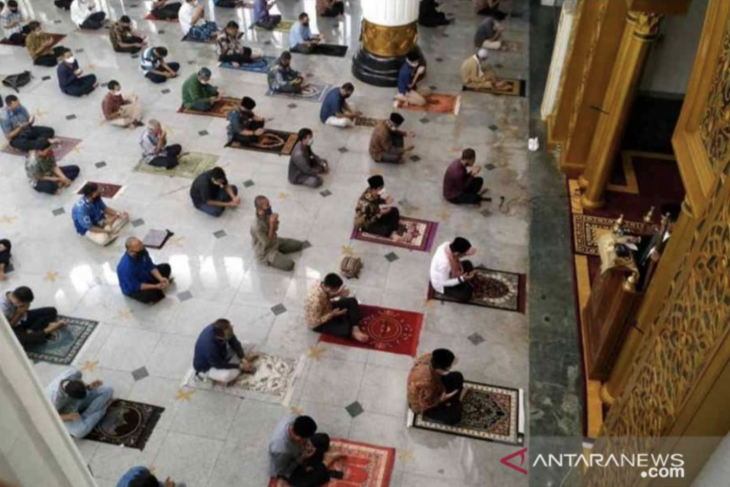
Following the issuance of these guidelines, President Joko Widodo visited Jakarta's Grand Mosque of Istiqlal to review its readiness to implement the new normal policies. He also visited the mosque within the Presidential Palace complex
"With proper signs and organization, which I have seen, as well as disinfection measures, we hope the Friday Prayers can resume at the mosque," he said on June 4, 2020.
With the central and provincial governments giving the green light to the reopening of places of worship, the Jakarta Archdiocese has prepared health protocols and strict enforcement measures for both church-goers and those serving in the churches. It is only allowing congregations to attend weekly and daily masses in limited numbers. Some of the services are still being carried out online, without congregations being allowed to be physically present at the churches.
To prepare for the new normal, the Indonesian Council of Mosques (DMI) has set the capacity for mosques at 40 percent during the new normal period, said chairman of the Council's Board, Jusuf Kalla.
A number of protocols are also being followed by mosques, including optimizing the use of speakers as an effective media for the dissemination of important and urgent information regarding COVID-19.
Meanwhile, the Indonesian Hindu Religious Council has urged its congregation to abide by the health protocols as they proceed to resume practices in the temples.
"The congregation should follow all health protocols. At the same time, we shall grow awareness and discipline," said chairman of the Indonesian Hindu Religious Council.
Jakarta's Dharma Bakti Buddhist Temple, which is among the tourist attractions in the city, has also reopened to public, including tourists, with certain health protocols put in place, including temperature checks and mandatory hand-washing.
According to a local media report, visitors also need to wear masks in the temple premises.With such a thorough set of guidelines issued by the government and protocols being strictly enforced by places of worship, it will ultimately come down to the people to maintain awareness and discipline in following them so that places of worship do not emerge as new clusters of COVID-19 spread.
Related news: Restaurants in Jakarta reopen doors with caution
Related News: Implementing health protocols in wet markets remains challenging
Related News: Public transport adapts for new normal, continues alternate seating
Editor: Gusti Nur Cahya Aryani
Copyright © ANTARA 2020
